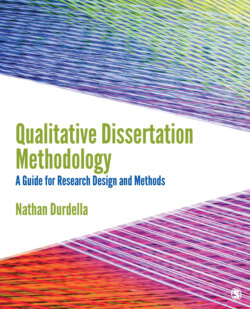Читать книгу Qualitative Dissertation Methodology - Nathan Durdella - Страница 25
На сайте Литреса книга снята с продажи.
Designing an Executable Qualitative Dissertation Methodology
ОглавлениеWhile advanced research skills, realistic and achievable research goals, and a thoughtful research plan may define a dissertation study as executable, every project needs resources to support research activities. Time, talent, and money—these are the resources that you need to consider as you design your study. Of course, funded research in graduate school is often limited, but the good news is that support for research at this level usually relates to dissertation projects. In the next section, “Putting Together Your Qualitative Dissertation Advising Chair and Committee,” you can see an extended discussion on talent—working with a group of advising faculty to support your dissertation research work. A discussion of funding dissertation research is beyond the scope of this book—but my advice to you is to explore sources of support on and off campus—for data collection (digital audio recorders, digital video recorders, digital transcription machines, web and mobile apps, participant compensation, etc.), data analysis (e.g., software licensing and training, transcription services, etc.), travel, and editing (if needed). If you have the personal resources to support your dissertation work, then by all means access and use them—they can facilitate work in the field and office. In my own dissertation work, I relied on a combination of institutional support, part-time work off campus, and family members to help me.
As a graduate student, you may think that perhaps a more elusive resource than funding is time. Pressed by coursework, meetings, assignments, work, family, and personal commitments, when do you imagine writing and conducting research related to your dissertation? We all face this quandary—time is an extremely precious resource. Key questions to consider here are, What is your time to degree? Where are you at on your career path? How has your dissertation chair (or potential chair) circumscribed a project timeline? As a dissertation chair, I frequently share my expectations for progress with my students—with product deliverables and ritualistic ceremonies marking milestones. And students tend to work with me to clarify submission dates and negotiate timelines. You should do the same with your chair, ensuring that you collaborate on expectations for deliverables as you move through the research process. While program variation and individual circumstances often shape the length of time to complete a dissertations study, you can outline a tentative schedule to chart a course that guides your work from start to finish. If you just include major milestones in a timeline, you can help yourself set achievable goals for task completion. You can see a 3-year dissertation timeline template in Table 1.1.
Even if you work with a dissertation timeline and try to stick to a schedule to submit dissertation drafts to your chair and committee, you will almost certainly face challenges in developing and implementing your qualitative dissertation study. As you will see in subsequent chapters in the book, qualitative researchers often encounter a range of issues that slow or halt project work or fieldwork temporarily. At the proposal development stage of the research process, you could receive feedback from your chair or a committee member that requires extensive revisions or rewrites to drafts, or you could be questioned on how you frame conceptual or methodological dimensions of your proposed study. Later, as you implement your study, you may experience issues that arise in the field and translate into delays to progress in your research, including revising procedures in an institutional review board (IRB) protocol, difficulty gaining access to data sources or recruiting participants at a site or sites, updating data collection methods or instruments from patterns that emerge in the field, and processing data to prepare for analysis. In situations where you cannot completely control how your research work moves, you will need to adjust a timeline that you set or your chair and you agree on and account for interruptions to progress in your study.
